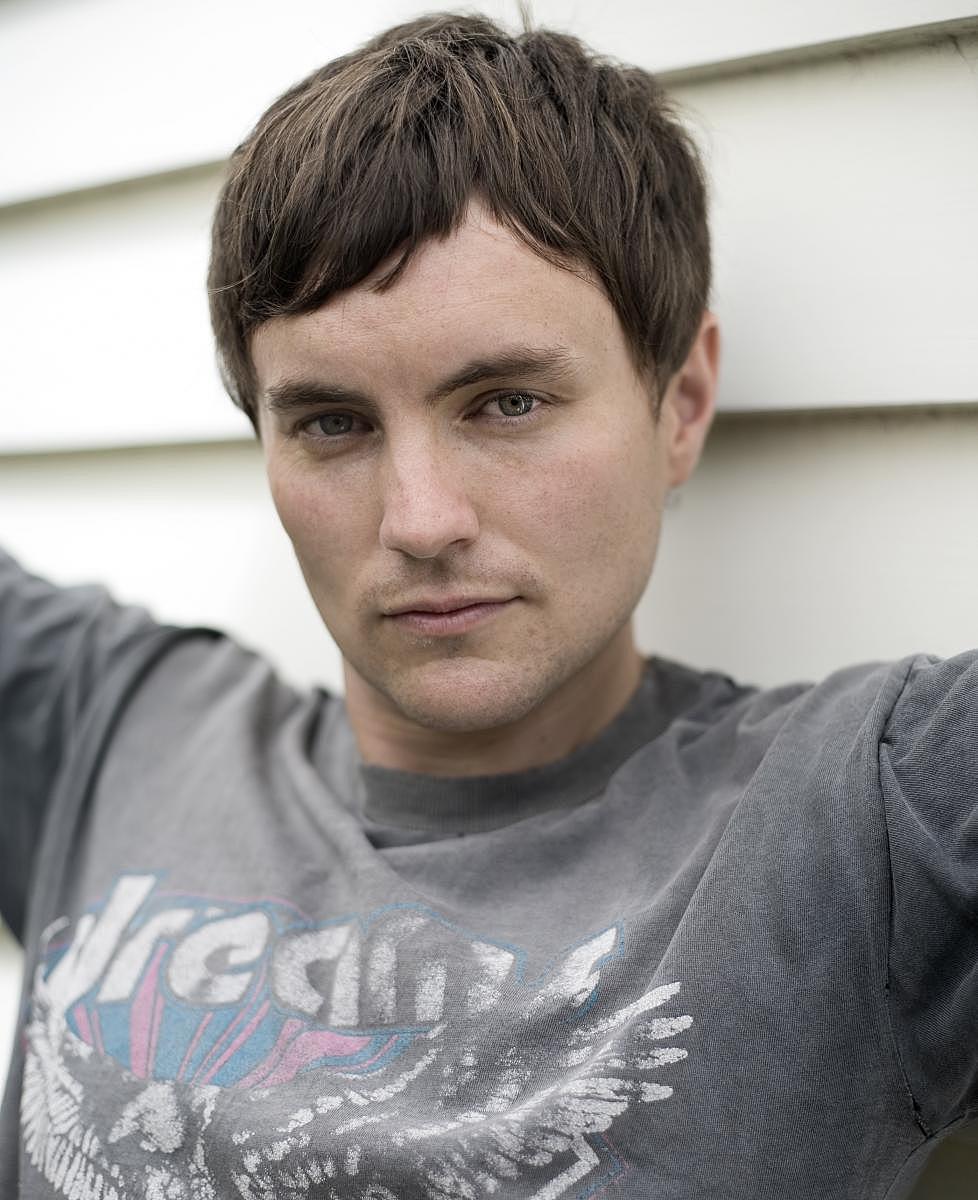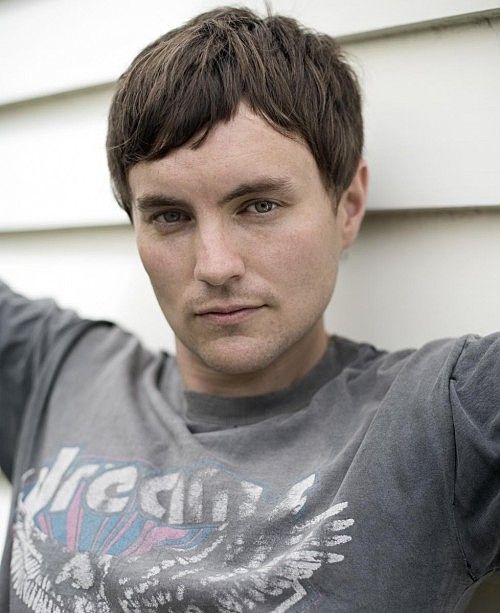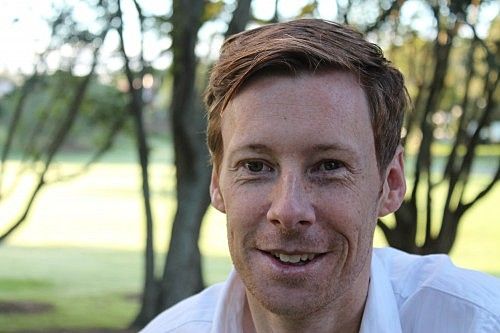The High of Lo-fi
Theatre is exploding across Auckland. So many plays. So many of them by Tom Sainsbury, one-man theatre industry.
[caption id="attachment_4690" align="alignnone" width="500"] Photo: Playmarket[/caption]
“Tom Sainsbury is one of New Zealand’s brightest writing talents, and certainly the most prolific. He’s written another new play in his head, just while sitting here tonight.”
– James Griffin
Writer of Outrageous Fortune, The Almighty Johnsons, and Sione’s Wedding
No matter when you’re reading this, there’s a good chance Tom Sainsbury has a play on. On the off-chance he doesn’t, he’ll probably be writing one. Last week, he was at the Basement co-starring in a series of short plays he co-wrote; tonight, he’ll be at the Maidment studio, co-starring in a dance thriller he wrote; and late last year, Greg Bruce followed him through the production of one of his myriad plays to find out what it’s like being New Zealand’s most prolific playwright.
*
To the surprise of no one in the theatre scene, but to the knowledge of basically nobody else, Tom Sainsbury has a new play opening in two weeks. “Low key,” he calls it.
It’s a bright weekday afternoon. Tom and the play’s director, Abigail Greenwood, are talking with the theatre manager about logistics. More specifically, the director is talking with the theatre manager. Tom is wandering around the theatre.
“Oh look!” he says, ignoring a discussion about lighting, “It’s my pot plant!” He takes it into the bathroom and runs it under the tap. He says he does this every time he’s here. Apparently he’s the only one. It appears desperate to die.
The theatre manager has just been telling Tom and his director that the upstairs of the Basement, where they’ll be performing, can fit 85 people, which it clearly can’t, although incredibly, and uncomfortably, they later find out, it actually can. It’s very black in here. The brown-tipped pot plant, now back in the corner, is a lonely and pathetic splash of colour.
The watering done, Tom looks for something to do other than involving himself in the plans being made for his play. “Too much talking, eh?” he says to no one in particular. “Like, come on! Just make a decision.”
Moments like these were obviously not his motivation for becoming the country’s most prolific playwright, and one responsible for some of the cleverest, funniest, least-seen theatre in years.
When the meeting finally ends and Tom gets in the passenger door of his old Nissan Sunny, clambering across to unlock the broken driver’s door, you can’t help but ask, what is his motivation?
*
It is a stupid thing to ask people why they do what they do, since their reasons are always well-intentioned pieces of self-deception. But because it is somebody’s job to ask that question, and because with the right amount of thought - which is to say, usually more than the subject gave it - a great deal of meaning can sometimes be found, and because it’s sometimes more interesting than talking about the weather, it is asked.
“Because I like a good story well told,” he says. “Is that a bit wanky?”
Tom Sainsbury, 30, wrote this play – Crims – in a week. He has published 30 plays, co-written and collaborated on a heap more, and at current pace will overtake Shakespeare’s lifetime output of 38 within the next year. Theatreview, New Zealand’s leading theatre site, describes his condition as Compulsive Playwright Syndrome. Everybody working in theatre knows him. Many of them have been in his plays.
So, wanky or not, “a good story well told” doesn’t really get to the bottom of things. We all like a good story, but most of us get it from the library or the Home and Away omnibus on Sunday mornings. Putting on a play every few weeks seems like overkill.
Tom also co-wrote TV3’s hit comedy series Super City with Madeline Sami, for which the two were nominated for an Aotearoa Film and Television Award. Meanwhile, funding was secured in late August for Super City’s second season.
Whenever he writes, Tom says, it just comes out funny, for better or worse. Crims is different though, he says: “It’s not funny. It’s just tragic”.
To put it mildly, this seems like a lie.
*
“How is your life, Ryan?” Tom asks Crims’ lead actor, an hour or two after the meeting at The Basement. “Is everything good for you or do you have any karma that you need to overcome?” Today’s rehearsal, to be held in Ryan’s St Lukes’ living room, has not yet begun.
“Oh yeah, shit yeah,” Ryan says. “I live with my partner and we’re both extroverts and that’s pretty challenging. It’s not about the good times. The good times are fucking great. It’s how you deal with the bad times.”
“Are you an extrovert, Abigail?” Tom asks his director.
“I’m not sure.”
“Well, the definition is, if you get your energy from being around other people you’re an extrovert, and if you get it from being by yourself, you’re an introvert.”
“What are you, Tom?” someone asks.
“I’m totally an introvert.”
“I’m not sure if you’re joking.”
“No, I’m serious.”
“But you seem like an extrovert, and your whole life is about being around other people.”
“I know. That’s why I’m always so exhausted.”
*
[youtube http://www.youtube.com/watch?v=JUxUoymTscU?rel=0]
The promotional campaign for Crims:
- A 60 second YouTube video of Tom and Ryan at rehearsal (73 views)
- An interview (six minutes) with Tom on bFM the day before the show
- Tom changes his Facebook profile picture to a poster of Crims
- Some complimentary opening night tickets.
The play also gets mentioned at the bottom of a New Zealand Herald article about another play, although Tom doesn't find out about that until after it's published so it probably doesn't count: “That should get another one, maybe two, people along,” he says, when told.
There’s a lot of theatre on in Auckland these days: “It's become huge, hasn’t it?” Tom says. “So much theatre going on all the time. And to be honest I think I got in there first. Is that wanky to say? I think people saw that it could be done so they did it too. I think Toi Whakaari and Unitec have also been good at promoting people to make their own work.”
Theatreview has ten Auckland reviewers. One of them, Lexie Matheson, says she will review 50 plays this year alone.
Who, apart from Lexie Matheson (and maybe nine other Auckland reviewers), is going to see 50 plays this year? Who’s even going to see five? Most of these plays will disappear, largely unseen.
It would be great to say that Crims bucked the trend and took Auckland by storm, or even that it passed through The Basement like a gentle breeze, but theatre is well sheltered from the fickle winds of success.
A few more than 20 people turned up on the first night, which Tom called preview night. The next night – opening night – was full, although most of the 85 patrons had free tickets, and one person left during the performance because it was distractingly hot. The remaining three nights were about three quarters full. Overall, about 300 people came during the show’s five-night run.
Tickets were $20 each and, for what it’s worth, the show made a profit of about $2000. When you spread that across a week of writing, three weeks of rehearsals and five performances, then split the take between five cast and crew, well, nobody’s getting rich.
“I don’t know why anyone would pay $49 to watch a show,” Tom says. “If you want to watch a big show, you can go to the cinema. It’s cheaper. I try to create a connection with the audience. Like with Crims, I like when they get to see the actors change characters in front of their eyes.
“I like doing shows that are lo-fi,” he says. “Write that down.”
This might be starting to get closer to an answer, but it’s more of an answer to ‘what?’ than an answer to ‘why?’
*
It’s opening night: Kate Simmonds sprays Tom in the face with what looks like a working aerosol can and he hits the ground screaming in what looks like genuine agony. The audience explodes with laughter.
The doors have been shut for only a few minutes, but there’s no air conditioning and the audience are already fanning themselves. The smell of sizzling marinated meat filters through from the kitchen of Tanuki’s Cave next door.
Tom changes character in front of the audience’s eyes. He’s now a middle-aged dad, playing cards with his middle-aged wife, played by Kate Simmonds, Their son Willy, played by Ryan Richards, admits he just stole a pack of condoms. Tom licks his thumb, peers over his half-glasses and says, “What do you need condoms for? No bitch is going near that pecker.” The crowd goes crazy for it.
A funny thing takes hold once the crowd realises they’re watching something funny: it gets funnier. What might have got a chuckle gets a belly laugh. What might have got a belly laugh gets a doubled-over gut grabber. And so on. Jeremy, also played by Ryan Richards, calls his mother from a cellphone: “Hi mum, it’s Jeremy,” he says, pauses for a second, pretends to listen, then says, “Hahahaha! Thanks!” The crowd goes crazy for it.
Kate says “Step back goal attack!” They go crazy for it. Tom says “You’re not going to self harm yourself are you?” Crazy for it. Ryan sings an ad jingle for Tom’s organic vegetable garden business: “Gr-gr-gr-Grow it! Grow it!” Crazy. For. It.
Just 24 hours ago, Tom had been convinced this play was a tragedy.
After an hour of near-sustained laughter, the cast take their bows to crashing applause and then head backstage carrying armfuls of props. Another play starts in a few minutes, and the cast are already pouring onstage with their own arms full of props. Slick with sweat, Tom and the others push their stuff into a corner of the green room, ready for tomorrow night.
“Great show guys,” an audience member says.
“Thanks,” Tom says. “Were people laughing?”
He appears serious.
*
“Are you going to press the flesh now, Tom?” the audience member asks. Tom is walking down the stairs to the Basement’s lobby. He looks tense.
“Yeah,” he says. “Oh my God, I hate it. I hate it so much.”
30 or maybe 40 of the opening night crowd have stayed behind. Many of them smile and laugh as the cast appears at the bottom of the stairs. A few even clap.
Ryan and Kate head straight outside to where their friends are waiting. Tom, though, stops and hugs the first couple he sees (“Thanks so much for coming!”) and the next group he sees (“Thanks so much!”). And the next group, and the next group.
“There was one point I looked up and it was only you guys laughing!” he says to one couple.” They laugh, presumably at the absurdity of this claim.
Outside, Kate and Ryan chat with their friends. Kate leaves a few minutes later and Ryan heads inside to get a beer. When he returns a minute or two later Ryan finds that, at 8.20pm, only 10 minutes or so after they had cheered him so loudly, almost everybody has left. He stands with a hanger-on for a few minutes, talking about his day job selling insurance over the phone: “I hate it,” he says. He finishes his beer and walks alone across the Basement carpark and into the night.
There are two or three people left inside. Tom Sainsbury is one of them. Hating it.
*
“It was good,” Tom says, a few days after the play ends its run. “I didn’t feel like just walking offstage at any point, like I did with Joseph and Mahina. You know, like when you’re driving and you just think about swerving into oncoming traffic. Or throwing yourself off a bridge.”
The reviews are in. There are two of them. The one on Theatreview, not by Lexie Matheson, says it’s “a classic,” and calls Tom “a classic intuitive comedy writer.”
The other reviewer, on Theatrescenes, which nobody has heard of, says Tom is one of his favourite comic playwrights, but says Crims lacks depth or complexity. He also says that, as a work of “pure junk food comedy, it serves up a treat.” It’s a pretty decent review but what Tom takes from it is the junk food thing.
“It’s like, well all that work I put into the narrative arc was a waste,” he says.
He didn’t win the Film and Television Award for Super City. James Griffin won it for the final season of Outrageous Fortune, which was pretty much a fait accompli.
Tom was also nominated for outstanding new New Zealand play in the Chapman Tripp Theatre Awards, for Joseph and Mahina. The award was presented last December. He didn’t win that either.
Within two months of Crims, he wrote, rehearsed and staged A Krazy Kristmas: Six Short Yuletide Plays.He agonised over whether anybody would come, whether anybody would laugh. He agonised over the reviews. He hated talking to people afterwards.
His pot plant was still there: still, somehow, clinging to life.
A couple of years ago, while trying to make his mark in London, Tom kept a blog. In it, he quoted George Bernard Shaw:
‘This is the true joy in life, the being used for a purpose recognised by yourself as a mighty one, the being a force of nature instead of a feverish, selfish little clod of ailments and grievances, complaining that the world will not devote itself to making you happy.’
“Isn’t that amazing?” Tom wrote. “I hope you all read that and strive forward with your endeavours. Being bold, brilliant and beautiful.”
This may be the reason he doesn’t have a good answer for why he does what he does: the why actually isn’t all that important. It actually isn’t even all that interesting. Why do any of us do anything? We have a talent? A dream? We prefer it to selling insurance over the telephone?
What matters to him is not the finding but the doing. Being a force of nature. Being Tom Sainsbury.


